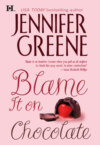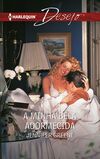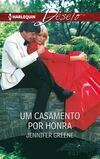Kitabı oxu: «Blame It on Chocolate»
When his head ducked, he saw those whiskey brown eyes deepen, darken. He heard her breath catch. Felt the sudden trembly chill in her fingertips. And then his mouth dived down and settled on hers.
She tasted like warm, dark chocolate. Rich. Soft. Meltable.
Nothing in the universe tasted exactly like chocolate. Not good chocolate. Not really exquisite chocolate.
But she did. And no, it wasn’t the Bliss she’d been indulging in that put that “exquisite taste” idea in his mind. It was her. Her mouth. Her taste. Her lips molded under his, melted under his. She went still, on the inside, on the outside.
And damn it. So did he.
Praise for the work of USA TODAY bestselling author Jennifer Greene
“Jennifer Greene’s writing possesses a modern sensibility and frankness that is vivid, fresh, and often funny.”
—Publishers Weekly on The Woman Most Likely To…
“This is a must read book. Great job, Ms. Greene!”
—Old Book Barn Gazette on
The Woman Most Likely To…
“Combining expertly crafted characters with lovely prose flavored with sassy wit, Greene constructs a superb tale of love lost and found, dreams discarded and rediscovered, and the importance of family and friendship….”
—Booklist on Where Is He Now?
“Crisp, pulls-no-punches humor….”
—Publishers Weekly on Where Is He Now?
Blame It on Chocolate
Jennifer Greene

MILLS & BOON
Before you start reading, why not sign up?
Thank you for downloading this Mills & Boon book. If you want to hear about exclusive discounts, special offers and competitions, sign up to our email newsletter today!
Or simply visit
Mills & Boon emails are completely free to receive and you can unsubscribe at any time via the link in any email we send you.
Recent books by Jennifer Greene
Lucky
Hot to the Touch
Wild in the Moment
Wild in the Moonlight
Wild in the Field
To incurable chocoholics everywhere.
Of all the vices worth enjoying, this one seems awfully close to number one.
I gined ten pounds researching this book for you.
Taste-testing the best truffles on the planet was hard work! But worth it.
Trust me on this….
CONTENTS
CHAPTER ONE
CHAPTER TWO
CHAPTER THREE
CHAPTER FOUR
CHAPTER FIVE
CHAPTER SIX
CHAPTER SEVEN
CHAPTER EIGHT
CHAPTER NINE
CHAPTER TEN
CHAPTER ELEVEN
CHAPTER TWELVE
CHAPTER THIRTEEN
CHAPTER FOURTEEN
CHAPTER FIFTEEN
CHAPTER SIXTEEN
CHAPTER SEVENTEEN
EPILOGUE
CHAPTER ONE
WHEN THE ALARM CLOCK BUZZED on Monday morning, Lucy Fitzhenry leaped out of bed. It was hell waiting for that alarm. She hated wasting time on sleep when her life was so brimming full. She wasn’t just jazzed to start the day; she was kite-high and dancing-ready.
She made it three feet across the room before the nausea hit. One second she was fine, the next she was beyond miserable. Thankfully she made it into the bathroom before a major upchuck.
Afterward, she knelt on the cold tile with her elbow crooked on the toilet seat, too weak to get up—at least for another couple seconds—feeling infuriated in general.
She knew she was getting an ulcer. This was the third time in the last two weeks her stomach had done the revolt thing, and healthy twenty-eight-year-old women with cast-iron stomachs didn’t hurl for no reason, so that had to be it. An ulcer. An ulcer caused by stress.
It was tough for a fussy perfectionist who’d always been big on responsibility and doing the right thing and making everyone happy to suddenly take on wickedness. She was trying. She was putting her whole heart into it. But it definitely wasn’t coming naturally, so she had to struggle at it, and changing one’s personality was unavoidably stressful.
Her stomach rolled one more time, but the ghastly part of the nausea seemed to have passed. She hoped. Slowly she pushed to her feet, opened the glass doors to the shower, and flicked on the faucets.
She’d had the clear glass shower doors put in last week. That, and her sleeping naked, were two visible signs that she was gaining on her wickedness goal. Another concrete measure of progress were the purple satin sheets on her bed. Temporarily she didn’t have a guy to vent all this new wildness on, but one thing at a time. Her stomach needed to recover from all these personality upheavals before she gave it any more stress.
By the time she climbed out of the shower, she was not only feeling fine again, but picking up speed. She ran naked into the kitchen to pop a bagel in the toaster, then charged back to the bedroom to raid her closet. Since ninety percent of her wardrobe consisted of either designer Gap or designer Old Navy, the day’s clothes decision was hardly tricky. She opted for Gap today. T-shirt. Sweatshirt. Jeans—not her favorite pair; they bagged a little in the butt, but she should have known better than to buy a size seven without trying them on; they were always a little big.
Back in the bathroom, she poked in her contacts, smacked on lip gloss, and ran a brush through her chin-length blond hair—her hair was so fine it was already nearly dry. Then she claimed the bagel and streaked for the front door…taking ecstatic, if hurried, pleasure in galloping over the white carpet. White. WHITE. White, thick, plush and totally impractical. The print over the fireplace of the eagle flying over silvery-green waters was another splurge—she fiercely, fiercely loved that picture. But both the print and the carpet were further proof that she was mastering the indulgent, impractical, wicked thing.
Of course, the carpet wasn’t paid for. And neither was most everything else. But as of two months ago, she was no longer renting. The duplex had a mighty mortgage, but it was still hers-all-hers. Possibly she was the latest bloomer of all late bloomers at twenty-eight, but what the hey. She’d had to fight harder than most for true independence, and for darn sure, she was grabbing life with both fists now.
At the front door, she yanked on the jacket her parents had given her for Christmas—a white Patagonia number that was crazily impractical considering her work, but unbeatably warm. And on the first of March in Minnesota, there was still a solid, crusty foot of snow on the ground, the temperature cold enough to make her eyes sting. She locked the door, still pulling on her white cap with the yellow yarn daisies. She’d have hat hair all day, but who cared? She’d look like a train wreck after the first hour of work anyway.
With the hot bagel crunched between her teeth, she slid into the driver’s seat of her old red Civic, turned the key and begged it to start—which it did. The baby just liked to be coaxed on cold mornings. Praying for the Civic had become a second religion. The Civ had more than 200,000 miles on her. Lucy’s newest theory was that if she gave the car enough wash-and-waxes and changed its oil long before it asked and vacuumed it twice a week, it’d be too happy to die. At least until she got the living room carpet and couch paid for.
In Rochester, where she’d grown up, people knew what rush hour was. Not here. Eagle Lake probably put up traffic lights out of pride, although some cars did show up to keep her company once she reached the highway. Originally she’d chosen Eagle because it was a nice, long drive from her parents—and also because there was already a solid nest of singles and other young couples in the area—but it was a good half-hour commute to her job. She finished the bagel, tuned the radio up for a kick-ass beat and was singing hell-bent for leather when her stomach suddenly produced an unladylike belch.
Not AGAIN. Yet the nausea came on like a battleship, heavy and ugly and overwhelming. Her skin turned damp and hot so fast she barely had time to pull over to the shoulder and brake. Hands shaking, flushed and hot, she leaned over the passenger side, argued with the door, thank God got it open, arched her head out…and then nothing.
The bagel stayed in. The bite of freezing wind on her cheeks seemed to help. Eventually she sank back against the headrest, feeling weak and yucky, cars speeding past her. The practical voice in her head ordered her to quit messing around and call the doctor, enough was enough with this nausea thing.
But her emotional side kept trying to figure out what she’d done to deserve this. Yeah, she was trying to be more wicked, but basically the sins on her conscience wouldn’t fill a list. She’d skipped school once in kindergarten. She’d thought evil, evil thoughts about Aunt Miranda—but then, so did everyone else in the family. She’d gone to a party one time without underpants. She’d let Eugene hang on too long. She’d borrowed her sister Ginger’s blue cashmere sweater in high school and got a spot on it and never ’fessed up. And yeah, there was that one other occasion.
She’d come to call that one other occasion the Night of the Chocolate.
But as quickly as that memory surfaced, she shuffled it, fast, into the part of her brain labeled Denial. God—if there was a God, and she thought there was—just couldn’t be paying her back for that one. She’d already suffered enough.
When it came down to it, she’d lived like a saint 99.99 percent of her life. She dusted under the refrigerator, never took a penny that wasn’t hers, always flossed. Her family relentlessly teased her for becoming a fussy old lady before she was thirty—which really hurt her feelings.
The point, though, was that this stomach upset thing wasn’t a sign that her life was about to spin completely out of control. It was just an ulcer or something like that. A something that a visit to the doctor—however inconvenient and annoying—would resolve once and for all.
And just like that, she felt better. Her hands stopped trembling and the weak feeling almost completely disappeared. Cautiously she restarted the car and pulled out on the road. She didn’t turn the radio up and sing like her usual maniac self the rest of the way—why tempt fate? Sometimes it paid to be superstitious.
Twenty minutes later, she was still okay. In fact, not just okay, but feeling totally fine when she spotted the thousand-acre fenced-in estate. She turned at the tasteful, elegant sign for BERNARD’S.
The sign didn’t bother spelling out Bernard Chocolates. It didn’t have to. Anyone on four continents—at least anyone who appreciated fine chocolate—would easily recognize the name.
Even though it was Lucy’s second home, getting through the property every morning was more complicated than joining the CIA. Still, she was used to it. At the front gate, she simply popped in ID to make the electricity security fence open.
The driveway immediately forked in three directions. The road to the right led to the plant. The middle road meandered up to the Bernard mansion. Humming now, Lucy took the familiar third road that curled and swirled a half mile, bordered by lush pines and landscaped gardens.
A moment later she reached another electric fence—this one fifteen feet tall, with a gate that was both locked and manned 24/7. Instead of waving her through, Gordon hiked outside when he spotted her crusty Honda. “Hell, Miss Fitzhenry, I was about to call the cops. You’re seven minutes late. I was afraid you must be in an accident.”
Sheesh. Was she that predictable? “I’m fine, honest. Did you have a nice weekend?”
“Oh, yes. Me and the missus saw a good movie, had the grandkids over. In the meantime—both Mr. Bernards are up at the house. Asked me to tell you to stop by around ten this morning if you could.”
“Thanks. And you have a great morning,” Lucy said as she rolled up her window, but her pulse suddenly bucked like a nervous colt’s. Her pulse, not her stomach, thank heavens. The nausea seemed to be totally gone—but she still couldn’t stop the sudden bolt of nerves.
The nerves were foolish, really. Any day now, she’d known the Bernards would summon her for a serious meeting. Her last experiments had been beyond successful—so successful that they affected the entire future of the company. That was great news, not bad.
It was just that she normally met with Orson Bernard, not his grandson. On paper she reported to the senior Bernard, and God knew, she adored the older man, loved being with him and working with him both. Still, Orson was well over seventy and long retired. Everyone knew who really signed the paychecks these days.
It wasn’t as if Lucy didn’t like Raul Nicholas Bernard. She did. Orson’s grandson was too darned adorable and charming and sexy not to like. Everyone liked Nick.
She just always got rattled around him. He knew it. She knew it. Probably the birds in the trees knew it—which made her reaction to him all the more embarrassing. Realizing she was chewing on a thumbnail—a habit she’d broken at least ten years ago—Lucy firmly blocked that tangled thought train.
Behind her, the fence clanged shut. She caught Gordon’s wave from her rearview mirror and had to smile. Physically Gordon resembled a sublet Santa, but his background included intensive years as an army ranger.
It regularly tickled her funny bone that she could conceivably work in a place that required such expensive and extensive security. Funnier yet was that she actually had power over the security staff. Her. Lucy Fitzhenry. A woman who couldn’t control her own flyaway hair, couldn’t drink champagne without a fit of the giggles, and required a daily milk-shake to maintain 110 pounds.
Her mood turned serious as she took the last curve. A huge structure loomed in sight—her building. Her baby. From the front, the architecture resembled any other high-tech contemporary office structure. Sleek, lots of windows, clean lines. Past the office was the giant lab that everyone shared, then the spiderweb of individual labs, and far back—not in sight from any road—came the network of greenhouses.
She parked in the front row and hustled inside. This early in the morning, the core staff were holed up in their offices, trying to shovel through paperwork chores before they could move into the real meat of the day. Reiko, who must have had her hair scalped on Saturday, yelled out, “Hi, what happened to you?”
Lucy had to ask about Reiko’s squirt-aged son—who she’d love to marry, if he wasn’t a mere four—then sprinted on. Or tried to. Fritz and Fred had offices next. They’d both graduated from MSU last spring, although Lucy secretly thought that they weren’t men but druids. They were never tucked or brushed. Ever. Not even once, by accident. Their brains were sharper than lobster traps, but their humor was primordial and they were so dorky that she’d be amazed if they’d ever had a date. She was even more amazed how much she loved them. Still, like drone twins, they both showed up in their doorways at the same time to yell out, “Hey, Lucy, were you sick? Did someone die? Will the world survive your being late?”
“Would you cut it out, you guys? You act like I’ve never been late, for Pete’s sake.”
Actually, she hadn’t, but she was still offended that everybody labeled her so anal. You’d think she always colored inside the lines.
Which she did. Almost always. Except for that one serious time—but cripes, why did that have to keep popping into her mind today?
The instant she reached her office, she hung her jacket on the rack and switched on the computer. Her office was the size of a minute, but the walls were painted a pale peach and had a wily mile of ivy winding this way and that around the window and file cabinet. A stuffed Garfield supervised a corner of her desk. The only bare wall had floor-to-ceiling old posters of ads—Fry’s Cocoa, Bensdorp’s Cacao, Xocolata Amatller, Caley and Berne. No French labels.
French chocolate wasn’t brought up at Bernard’s. Such was considered on a par with yelling the F word in church.
Her favorite poster came from some trade show promotion that she didn’t remember—but the picture was of a woman wearing a dress made out of chocolate. Lucy only had to look at that dress to salivate.
She thumbed through the incoming mail and e-mail messages accumulated over the weekend, then grabbed a mug of tea from the break room and took off for her real work.
The central lab was quiet. It wasn’t the kind of lab that had beakers and Bunsen burners. The lighting was fabulous, the white floor clean enough to serve dinner from, and the work counters looked like someone’s designer kitchen—which, in a sense it was. This morning, though, the melangeur and conching machine and tempering kettles gleamed in the silence. Even with nothing going on, the smell of cacao haunted the room…a sexier smell than Chanel No. 5 any day, Lucy thought.
Past the labs came the greenhouses. She passed by Reiko’s projects, then Fred’s. The third greenhouse was her personal emotional Tiffany’s—or that’s how she thought of her work, as bringing her something worth more than any diamonds a lover could buy. She clicked in her security code, then entered.
Instantly, she was in another world, and so deeply immersed she forgot the time, the day and everything else. In a standard greenhouse, plants were organized in precise, tidy rows. Lucy’s setup was more a complex undercover garden of cacao plants, with youngsters mixed with mature and older growths. What a stranger might think was exotic and wild was actually a carefully planned environment.
She checked temperature, moisture levels, scents.
Back when she was seventeen, she’d entered college to become anything but a doctor. A degree in botany had seemed distant enough from medicine, but still, she’d never expected working with anything like this. It was a dreamer’s paradise.
Mentally she thought of cacaos as plants, even though she knew darn well they were trees. The history was part of the fun, or she’d always thought so. The original mama of all the cacao plants showed up somewhere around l5,000 years ago and was named Theobroma Cacao. Of course, Theo’s offspring had hugely evolved since those first wild, straggly trees in the Amazon basin of Brazil.
It didn’t smell like the Amazon here. It should have. The best cacao didn’t have to come from the Amazon, but ten thousand years hadn’t changed certain facts about chocolate—good cacao only grew in rain-forest conditions. Period. No exceptions. All attempts to coax chocolate from any other growing environment had failed.
Lucy knew the lore as well as her own heartbeat and she’d fought as fiercely as any mama lion for the survival of her personal babies. Bending down to study one of her oldest plants, she lifted one of the oblong, wrinkled leaves to study the football-shaped criollo pad. This one was heavily pregnant and close to bursting—which, in principle, couldn’t possibly happen.
The soil here had none of the “required” fecund, decaying matter of a rain forest but was plain old Minnesota topsoil, give or take certain nutrients. The temperature was cool, rather than equator-tropical. And the shade and mist absolutely required for cacao plants to thrive was the opposite here. Her babies loved slightly dry soil and adored sunlight.
All these experiments could have failed. There should have been no possibility of growing cacao under these conditions—at least not good chocolate. For damn sure, not unforgettably outstanding chocolate.
Sometimes the impossible came true, though. Sometimes a girl had to take a chance that no one else would take, if only to find out what she was made of.
A woman had priorities, as far as Lucy was concerned. Growing up, she’d heard a zillion times about how civilization was destroying the rain forests. She’d listened. She’d cared. But come on. Maybe the greenhouse effect was destroying rain forests, risking natural cures for cancer, risking changes in the climate across the globe, risking the future of the planet and all that yadda yadda. Lucy had bought the bumper stickers, for Pete’s sake. But it’s not like she had the power to save the earth. Cripes, she couldn’t even control her own hair.
But realizing that losing the rain forests would mean losing chocolate for all time had changed her perspective, because it made the problem personal. A world without chocolate was unthinkable.
The problem was enough to make even a quiet wallflower type suddenly turn power-hungry. The first day she’d taken this job, she’d sunk her teeth into the work with ardent, uninhibited, unbridled passion.
Reiko’s gentle voice suddenly came through the intercom. “Hey, Lucy. You got a call from the big house. Nick and Mr. Bernard figured you got your hands in mud and forgot the time—obviously they know you, cookie—but it’s after ten.”
Damn. It couldn’t be. She just got here. But when she glanced at her Swiss Army watch, it was twelve minutes after ten already.
Good thing her stomach problem had cleared up because she streaked the building at a breakneck pace. Even though she did have that tiny tendency to get lost in her work, she was never late and positively never late for a meeting with the Bernards.
It was faster to run cross-country than to drive. Seven minutes later, out of breath, her work boots damp and her hair flying, she charged into the mansion through the kitchen door—it had been well over a year since she’d wasted time bothering to use the formal front door.
Although her parents were a long way from poor, the Bernard wealth was something else again. For the first six months, she’d been lost just trying to find a bathroom in the place. The mansion was built like a castle, three stories, with turrets and mullioned windows and porticos. There were rooms for this and rooms for that and rooms probably no one had been in for the last century—which was about how old the house was.
As she pushed off her boots and whisked off her jacket, she heard the housekeeper singing down in the laundry room and the sound of a vacuum upstairs. Didn’t matter. She knew where she was going. There were meeting places all over the mansion, but for small gatherings Orson always choose the sunroom—a six-sided room built of waist-high stone and then glass walls climbing to a hexagonal peak.
She loved it almost as much as he did, and as expected, she found him ambling from window to window, enjoying every view. Orson was tall and lean, his face a rectangle of expressive wrinkles, his head balder than a pool cue. Never mind his age, he was still more full of hell than any ten men in her own age bracket.
“Lucy!” His face lit up when he spotted her, and ignoring the employer-employee relationship entirely, wrapped an arm around her shoulders in an affectionate hug.
“I’m sorry I was late. I don’t even have an excuse. Gordon told me you wanted me here at ten. I just got busy in the greenhouse.” She hugged back before stepping away, thinking that he always made her feel more like a co-conspirator than a minor underling of a major business magnate. He was shrewd and warm and as stubborn as an old goat. Possibly he’d been a bear to work for in his younger days, but Orson was using his retirement to go for dreams he’d never had a chance to when he was younger. And she was one of his happiest co-conspirers.
“I guess we’ll forgive her, eh, Nick? Get yourself some coffee or tea from the table. The three of us need to have a powwow.”
She swallowed quick before turning to greet Nick. Then wanted to swallow a second time.
Nick had suit days and working-clothes days. Today he was in serious navy-blue, and he wore a suit the way a young Cary Grant used to, all careless grace and elegance. Usually she could handle him in a suit, because there was so much natural distance between her dirt-under-the-fingernails and his classiness that they might as well speak different languages. When he was wearing a black T-shirt and jeans, though, she had to admit he made her heart thump.
This morning, the sharp white shirt and formal navy-blue didn’t seem to do the distance-job. Her throat still went dry. Her pulse soared like a leaf in a high wind. He had his grandfather’s long rectangular face, the strong jaw, the strong cheekbones, the startling blue eyes. His hair was a thick dark brown, and no matter how ruthlessly he brushed it, it never lay quite straight. It wasn’t curly or wild exactly, more like it had an irrepressible rebellious streak. Just like him.
Near anyone else, she didn’t worry about her appearance—between messing with dirt and chocolate, she just didn’t have a job requiring haute couture. Around him, though, she felt hopelessly conscious of her kid-like jeans and flat figure. She could put forty-seven style products on her hair and it’d still be fine and flyaway. She always chewed off her lipstick. If she could afford to shop on Rodeo Drive, Lucy had the sneaky suspicious she’d still end up looking like an all-American kid sister. Glamour just wasn’t her. And that was okay. With everyone else.
“Nick,” she said warmly, “How’s your Monday going?”
She’d fantasized about him all her life. Maybe technically she hadn’t met him until she hired on at Bernard Chocolates, but that was neither here nor there. He made her feel hot and achy the way she always dreamed a guy would make her feel. Every cell in her body, every pore, came alive when he was in the same room. His smile gave meaning to the word yearning. His eyes gave in-depth potential to the whole concept of lust.
It was so tiresome.
“So far, the Monday’s been a little wild. How’s yours going, Luce?” He handed her a mug, peach tea, a scoop of sugar, without having to ask. It wasn’t the first meeting they’d had together.
It wasn’t the first time he’d been quietly considerate with her, either.
Unfortunately, his being nice never stopped her heart from thundering, her eyes from looking, her pulse from hiccupping every time she was around him. She took her mug and settled on a chair next to Orson, hoping that she’d get a grip before she had to kick herself.
In the beginning, she’d found her reaction to him kind of kicky. She hadn’t had a crush in years; it was kind of fun—and God knew, he was a sexy hunk, so why not enjoy it? But time passed. She was serious about her work, and both wanted and needed to be taken seriously—which he did. The crush thing just stopped being cute. It shamed her to respond in such an immature way to a guy who’d always been good to her—in a big-brother, thoughtful-employer kind of way. Nick Bernard may only be in his early thirties, but they might as well have been a century apart in experience and lifestyles.
When she and Orson settled in the thick, soft upholstered chairs, Nick pulled over an ottoman and hunkered down, then motioned for his grandfather to start the dialogue.
“Lucy…you know we’ve got our miracle. The quality of those experimental plants is beyond anything we’ve ever dreamed. But now it’s time to do something about it.”
“Yes, sir.” This was exactly the subject she was expecting and she couldn’t agree more.
“It’s not time to stake the company on it, or to put all our bets in one basket yet.”
“Of course not, sir.”
“But it is time to make a move. If this develops the way we hope, we’ll be buying land and creating an extensive cacao forest in several locations. But for now, we have ample space to put up five or six more greenhouses—enough expansion to play with some products and real production. Obviously we’ll want to stagger the plantings, so we’ll have varied ages and varied crops coming into production at different times.”
“Of course, sir.”
“I’m unwilling to take this off-property where there’s such a huge security issue. As I know you understand, word of what we’re doing could have an explosive effect on the Coffee and Sugar Exchange. We’re talking an immediate effect of millions, if not billions. But that’s potential. All we know right now is that we’ve got a taste of something that looks like gold. It hasn’t been completely tested.”
She put down her tea. Somehow she couldn’t finish a hot drink to save her life this morning, but for darn sure, she was too excited to drink it now. “I know, I know. And I just totally agree with everything you’re saying.”
“Well, good. Because this is really your brainchild, Lucy.”
“Oh, no. Not really. I mean, I think of it as my baby—but you both know I only hired on after the whole experiment had been started. It wasn’t originally my experiment—”
“Yes, but you’re the one who took it on. Who brought it to fruition.”
“Only because Ludwig was such an incredible teacher.” She hadn’t forgotten the old man—Orson’s horticulturalist—who’d brought her into the fold, made mincemeat of her botany degree, and then taken the time to give her the intensive, practical education that mattered.
“This is no time to be modest, Lucy. I know what Ludwig did. But I also know what you accomplished on your own in the last few years. More important yet, we know that we can completely trust you, right, Nick?”
Lucy glanced at Nick, only to feel uneasiness stir. Whatever was on Orson’s mind, Nick clearly didn’t agree with his grandfather. His handsome face went still, his expression cool. “Yes. We trust you, Lucy.”
He didn’t say but, but she mentally heard it. Orson continued on.
“When we take all this public—several years down the road—I don’t know what kind of management setup we’ll need. Or what part you’ll want to play in it. But right now, we want to expand and yet stay private. Put serious money into more extensive experiments and yet not take untoward financial risks.” Orson leaned back and crossed his leg over a knee the same way his grandson did. “Lucy, I wonder how much you feel you could handle.”




























